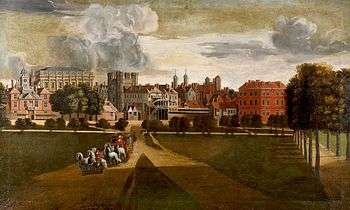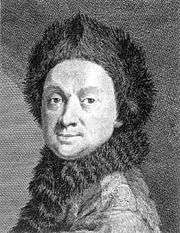1698
1698 (MDCXCVIII) was a common year starting on Wednesday of the Gregorian calendar and a common year starting on Saturday of the Julian calendar, the 1698th year of the Common Era (CE) and Anno Domini (AD) designations, the 698th year of the 2nd millennium, the 98th year of the 17th century, and the 9th year of the 1690s decade. As of the start of 1698, the Gregorian calendar was 10 days ahead of the Julian calendar, which remained in localized use until 1923.
| Millennium: | 2nd millennium |
|---|---|
| Centuries: | |
| Decades: | |
| Years: |
| 1698 by topic |
|---|
| Arts and science |
| Leaders |
| Birth and death categories |
| Births – Deaths |
| Establishments and disestablishments categories |
| Establishments – Disestablishments |
| Works category |
|
| Gregorian calendar | 1698 MDCXCVIII |
| Ab urbe condita | 2451 |
| Armenian calendar | 1147 ԹՎ ՌՃԽԷ |
| Assyrian calendar | 6448 |
| Balinese saka calendar | 1619–1620 |
| Bengali calendar | 1105 |
| Berber calendar | 2648 |
| English Regnal year | 10 Will. 3 – 11 Will. 3 |
| Buddhist calendar | 2242 |
| Burmese calendar | 1060 |
| Byzantine calendar | 7206–7207 |
| Chinese calendar | 丁丑年 (Fire Ox) 4394 or 4334 — to — 戊寅年 (Earth Tiger) 4395 or 4335 |
| Coptic calendar | 1414–1415 |
| Discordian calendar | 2864 |
| Ethiopian calendar | 1690–1691 |
| Hebrew calendar | 5458–5459 |
| Hindu calendars | |
| - Vikram Samvat | 1754–1755 |
| - Shaka Samvat | 1619–1620 |
| - Kali Yuga | 4798–4799 |
| Holocene calendar | 11698 |
| Igbo calendar | 698–699 |
| Iranian calendar | 1076–1077 |
| Islamic calendar | 1109–1110 |
| Japanese calendar | Genroku 11 (元禄11年) |
| Javanese calendar | 1621–1622 |
| Julian calendar | Gregorian minus 10 days |
| Korean calendar | 4031 |
| Minguo calendar | 214 before ROC 民前214年 |
| Nanakshahi calendar | 230 |
| Thai solar calendar | 2240–2241 |
| Tibetan calendar | 阴火牛年 (female Fire-Ox) 1824 or 1443 or 671 — to — 阳土虎年 (male Earth-Tiger) 1825 or 1444 or 672 |
| Wikimedia Commons has media related to 1698. |

January 4: The Palace of Whitehall is destroyed by fire.
The first year of the ascending Dvapara Yuga.
Events
January–June
- January 1 – The Abenaki tribe and the Massachusetts colonists sign a treaty, ending the conflict in New England.
- January 4 – The Palace of Whitehall in London, England is destroyed by fire.[1]
- January 23 – George Louis (who in 1714 will become King George I of Great Britain) becomes Elector of Hanover.
July–December
- July 14 – Darien scheme: The first Scottish settlers leave for an ill-fated colony in Panama.
- July 25 – English engineer Thomas Savery obtains a patent for a steam pump.[2]
- August 25 – Peter the Great arrives back in Moscow; General Patrick Gordon has already crushed the Streltsy Uprising, with 341 rebels sentenced to be decapitated (tradition holds that tsar Peter decapitated some of them himself).
- September 5 – In an effort to move his people away from Asiatic customs, Tsar Peter I of Russia imposes a tax on beards: all men except priests and peasants are required to pay a tax of either 100 or 60 rubles a year, depending upon status; peasants are required to pay two half kopecks each time they enter a city.
- October 24 – Iberville and Bienville sail from Brest to the Gulf of Mexico, to defend the southern borders of New France; they will eventually found three capitals of Louisiana (New France), as the future American cities of Mobile, Biloxi & New Orleans.[3]
- November – Tani Jinzan, astronomer and calendar scholar, observes a fire destroy Tosa (now Kōchi) in Japan at the same time as a Leonid meteor shower, taking it as evidence to reinforce belief in the "Theory of Areas".
- November 14 – The first Eddystone Lighthouse, built off Plymouth, England, is illuminated.[4]
- November 16 – A congress begins in Sremski Karlovci, to discuss a treaty between the Ottoman Empire and the Holy League.
Date unknown
- Bucharest becomes the capital of Wallachia (part of modern-day Romania).
- In Africa, Mombasa and Zanzibar are captured by Oman.
- The Whigs sponsor Captain Kidd of New York as a privateer against French shipping.
- Humphrey Hody is appointed regius professor of Greek at Oxford.
- John Churchill, Earl of Marlborough is reinstated in the English army after a period in disgrace.
- Since the establishment of its presidencies in 1689, the British East India Company has been under constant pressure from traders who are not members of the company, and are not licensed by the Crown to trade. Under a parliamentary ruling in favour of free trade, these private newcomers are able to set up a new company, called the New Company or English Company.
Births
- January 3 – Metastasio, (b. Pietro Antonio Domenico Trapassi), Italian poet and opera librettist (d. 1782)
- February – Colin Maclaurin, Scottish mathematician (d. 1746)
- February 16 – Pierre Bouguer, French mathematician, geophysicist, geodesist, and astronomer (d. 1758)
- March 26 – Václav Prokop Diviš, Czech priest, scientist and inventor (d. 1765)
- May 8 – Henry Baker, English naturalist (d. 1774)
- May 17 – Gio Nicola Buhagiar, Maltese painter (d. 1752)[5]
- July 17 – Pierre Louis Moreau de Maupertuis, French mathematician (d. 1759)
- July 19 – Johann Jakob Bodmer, Swiss author (d. 1783)
- September 6 – Jean Thurel, French soldier (d. 1807)
- September 26 – William Cavendish, 3rd Duke of Devonshire (d. 1755)
- November 4 – Caleb Fleming, English dissenting minister, polemicist (d. 1779)
- November 28 – Charlotta Frölich, Swedish agronomist (d. 1770)
- December 24 – William Warburton, English critic and Bishop of Gloucester (d. 1779)
- date unknown
- Bernard Forest de Bélidor, French engineer (d. 1761)
- William Moraley, English-American indentured servant and autobiographer, a primary source for life in the Province of Pennsylvania (d. 1762)
- Baal Shem Tov, Polish rabbi and founder of the Hasidic movement of Judaism.
Deaths
- January 15 – Richard Boyle, 1st Earl of Burlington, Anglo-Irish nobleman, Lord High Treasurer of Ireland, Cavalier (b. 1612)
- January 10 – Louis-Sébastien Le Nain de Tillemont, French historian (b. 1637)
- January 22 – Frederick Casimir Kettler, Duke of Courland and Semigallia (b. 1650)
- January 23 – Ernest Augustus, Elector of Brunswick-Lüneburg (b. 1629)
- February 16 – Sir James Rushout, 1st Baronet, English politician (b. 1644)
- March 6 – Philip Sidney, 3rd Earl of Leicester, English politician (b. 1619)
- March 14 – Claes Rålamb, Swedish statesman (b. 1622)
- March 16 – Leonora Christina Ulfeldt, Danish countess (b. 1621)
- April 11 – Charles Morton, Cornish nonconformist minister (b. 1627)
- April 29 – Charles Cornwallis, 3rd Baron Cornwallis, First Lord of the British Admiralty (b. 1655)
- May 15 – Marie Champmeslé, French actress (b. 1642)
- June 5 – Elizabeth Maitland, Duchess of Lauderdale, influential British noblewoman (b. 1626)
- June 11 – Balthasar Bekker, Dutch minister and author of philosophical and theological works (b. 1634)
- June 29 – Paluzzo Paluzzi Altieri degli Albertoni, Italian Catholic cardinal (b. 1623)
- June 30 – Charles Cheyne, 1st Viscount Newhaven, English Member of Parliament (b. 1625)
- July 13 – Charles Somerset, Marquess of Worcester, English politician (b. 1660)
- July 18 – Johann Heinrich Heidegger, Swiss theologian (b. 1633)
- August 14 – Francisco de Aguiar y Seijas, Spanish cleric and bishop (b. 1632)
- August 25 – Fleetwood Sheppard, English poet (b. 1634)
- August 31 – Miguel Jerónimo de Molina, Spanish prelate and bishop (b. 1638)
- September 13 (bur.) – John Huddleston, English Benedictine priest (b. 1608)
- October 11 – William Molyneux, Irish philosopher and writer (b. 1656)
- October 23 – David Klöcker Ehrenstrahl, German artist (b. 1628)
- November 4 – Rasmus Bartholin, Danish physician and scientist (b. 1625)
- November 13 – Johann, Count of Leiningen-Dagsburg-Falkenburg (b. 1662)
- November 23 – César-Pierre Richelet, French grammarian and lexicographer (b. 1626)
- November 28 – Louis de Buade de Frontenac, Governor of New France (b. 1622)
- December 1 – Ferdinand Joseph, Prince of Dietrichstein, German prince (b. 1636)
- December 16 – Simone Pignoni, Italian painter (b. 1611)
- December 26 – Wolfgang Julius, Count of Hohenlohe-Neuenstein, German field marshal (b. 1622)
- date unknown
- Nicholas Barbon, English economist (b. c. 1640)
- Franciscus Mercurius van Helmont, Flemish alchemist (b. 1614)
- in fiction – Mircalla Karnstein, Countess of Karnstein (b. 1680)
gollark: ***undine***
gollark: Really? An octahedron?
gollark: Sure.
gollark: Fire Gem x Sunsong?
gollark: Alt omen wyrms are quite bright.
References
- "Fires, Great", in The Insurance Cyclopeadia: Being an Historical Treasury of Events and Circumstances Connected with the Origin and Progress of Insurance, Cornelius Walford, ed. (C. and E. Layton, 1876) p48
- Carlyle, E. I. (2004). "Savery, Thomas (1650?–1715)". Oxford Dictionary of National Biography. Oxford University Press. doi:10.1093/ref:odnb/24733. Retrieved November 5, 2011. (subscription or UK public library membership required)
- O’Neill, C. E. (1974). "Le Moyne de Bienville, Jean-Baptiste". In Halpenny, Francess G (ed.). Dictionary of Canadian Biography. III (1741–1770) (online ed.). University of Toronto Press.
- Majdalany, Fred (1959). The Red Rocks of Eddystone. London: Longmans. p. 49.
- Schiavone, Michael J. (2009). Dictionary of Maltese Biographies Vol. 1 A–F. Pietà: Pubblikazzjonijiet Indipendenza. pp. 339–340. ISBN 9789993291329.
This article is issued from Wikipedia. The text is licensed under Creative Commons - Attribution - Sharealike. Additional terms may apply for the media files.

.jpg)